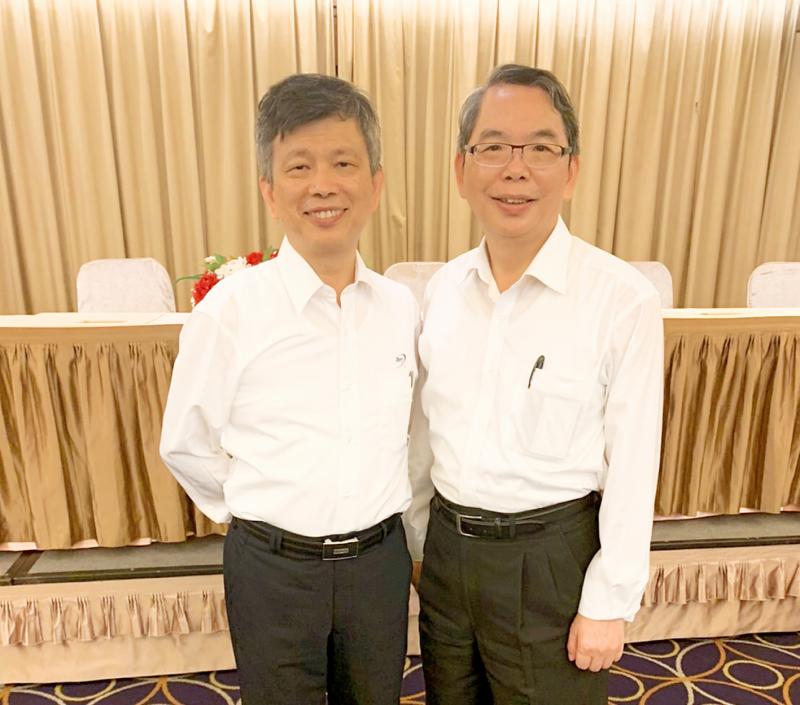Wafer and chip testing services provider Chunghwa Precision Test Technology Co (中華精測) yesterday reported that revenue last month grew 67.8 percent annually, fueled by rising demand for 5G-related chips, and processors for smartphones and servers.
As the COVID-19 pandemic has not stalled the deployment of 5G, Chunghwa Precision has “a cautiously optimistic view about the outlook for the third quarter,” it said in a statement.
The improving COVID-19 situation and the escalating 5G race between China and the US have also helped bolster demand for its wafer testing services and vertical probe card (VPC) business, it said.

Photo: Hung Yu-fang, Taipei Times
For the full year, Chunghwa Precision expects 5G applications and base stations to fuel demand for wafer testing services, given the complexity of 5G chips.
As the pandemic is raising uncertainty about the global economy, Chunghwa Precision said it is closely monitoring how the disease would affect consumer demand.
Revenue jumped to NT$353.2 million (US$11.81 million) last month, compared with NT$210.46 million a year earlier, hitting a nearly seven-month high.
On a monthly basis, revenue expanded 3 percent from NT$343.04 million.
That brought the company’s revenue in the first five months of the year to NT$1.6 billion, up 55.7 percent from NT$1.03 billion during the same period last year.
“The company’s expansion into the VPC market has borne fruit in May. The VPC is used in [testing] application processors for radio frequency, smartphones and ARM-based servers,” Chunghwa Precision said in a statement.
VPC sales last month grew 1.18 times to NT$2.76 billion from a year earlier, benefiting from rising demand for high-performance computing devices such as servers.
With its VPC portfolio expanding, the firm expects the risk of a single-customer concentration has dropped significantly.
The company has a 70 percent share of the global VPC market for smartphone application processors.
Revenue at the company’s probe service for printed circuit boards last month dropped 7.23 percent year-on-year to NT$540 million.
Shareholders yesterday approved the distribution of a cash dividend of NT$10 per common share, representing a 1.58 percent yield based on the stock’s closing price of NT$631.
That translates into a payout ratio of 45.79 percent, based on earnings per share of NT$21.84.
Shareholders also elected a new board of directors. The seven-member board tapped Lin Kuo-feng (林國豐) to be the new chairman, succeeding Huang Hsiu-gu (黃秀谷).
Lin, former president of Chunghwa Telecom Co’s (中華電信) mobile business, represents Chunghwa Investment Holding Co (中華投資), an entity wholly owned by the nation’s largest telecom.
Chunghwa Precision president Scott Huang (黃水可) was re-elected and would take a seat on the board.
The new board is to serve a three-year term until June 2, 2023.

In Italy’s storied gold-making hubs, jewelers are reworking their designs to trim gold content as they race to blunt the effect of record prices and appeal to shoppers watching their budgets. Gold prices hit a record high on Thursday, surging near US$5,600 an ounce, more than double a year ago as geopolitical concerns and jitters over trade pushed investors toward the safe-haven asset. The rally is putting undue pressure on small artisans as they face mounting demands from customers, including international brands, to produce cheaper items, from signature pieces to wedding rings, according to interviews with four independent jewelers in Italy’s main

Japanese Prime Minister Sanae Takaichi has talked up the benefits of a weaker yen in a campaign speech, adopting a tone at odds with her finance ministry, which has refused to rule out any options to counter excessive foreign exchange volatility. Takaichi later softened her stance, saying she did not have a preference for the yen’s direction. “People say the weak yen is bad right now, but for export industries, it’s a major opportunity,” Takaichi said on Saturday at a rally for Liberal Democratic Party candidate Daishiro Yamagiwa in Kanagawa Prefecture ahead of a snap election on Sunday. “Whether it’s selling food or

CONCERNS: Tech companies investing in AI businesses that purchase their products have raised questions among investors that they are artificially propping up demand Nvidia Corp chief executive officer Jensen Huang (黃仁勳) on Saturday said that the company would be participating in OpenAI’s latest funding round, describing it as potentially “the largest investment we’ve ever made.” “We will invest a great deal of money,” Huang told reporters while visiting Taipei. “I believe in OpenAI. The work that they do is incredible. They’re one of the most consequential companies of our time.” Huang did not say exactly how much Nvidia might contribute, but described the investment as “huge.” “Let Sam announce how much he’s going to raise — it’s for him to decide,” Huang said, referring to OpenAI

The global server market is expected to grow 12.8 percent annually this year, with artificial intelligence (AI) servers projected to account for 16.5 percent, driven by continued investment in AI infrastructure by major cloud service providers (CSPs), market researcher TrendForce Corp (集邦科技) said yesterday. Global AI server shipments this year are expected to increase 28 percent year-on-year to more than 2.7 million units, driven by sustained demand from CSPs and government sovereign cloud projects, TrendForce analyst Frank Kung (龔明德) told the Taipei Times. Demand for GPU-based AI servers, including Nvidia Corp’s GB and Vera Rubin rack systems, is expected to remain high,